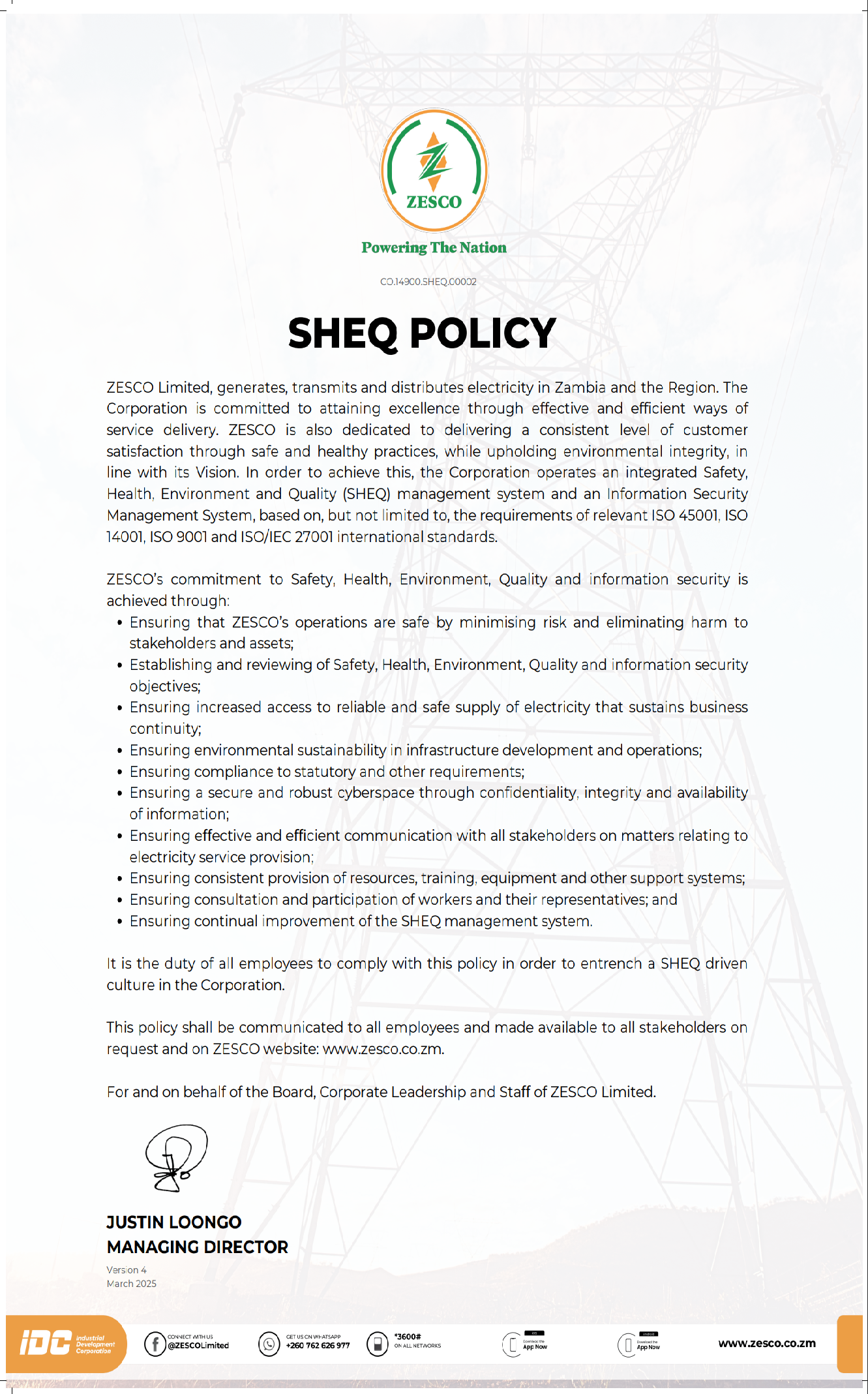
We provide Efficient, Innovative and Excellent Energy solutions to You
ZESCO Limited is a Zambian national power utility that is owned by the Government of the Republic of Zambia. Its mandate is to supply electricity and energy solutions within Zambia and the Sub Saharan region.
As a service provider, ZESCO has a passionate team of diverse professionals working throughout the country committed to deliver services, efficiently and effectively in the quest to attain excellence.
ZESCO's operations cut across the electricity value chain being generation, transmission, distribution, and supply. The Corporation owns and operates a number of hydropower stations with a combined power generating capacity currently at more than 2900 Megawatts (MW) and has a strategic intent to increase its power generation mix with a minimum of 1800MW of renewable energy in the next 10 years.
To transmit quality, reliable, and safe electrical energy services to its customers within Zambia and beyond its borders, ZESCO owns and operates an extensive and robust transmission network composed over 11,100 kilometres of high voltage transmission lines and is interconnected to the Southern African Power Pool.
ZESCO’s interconnected power network provides the Corporation with an extended power trading market, security of power supplies and power generation pooling. To enhance operational efficiency and security of power supply, ZESCO monitors and controls its vast interconnected power system using an automated system managed at its National Control Centre (NCC).


About our History
The development of electricity in Zambia traces back to 1906 with the establishment of a small thermal station in Livingstone, initially serving a portion of the town. Despite the potential at Victoria Falls, it wasn't until 1938 that hydroelectric power was first generated, marking a significant shift in power generation. Early on, power development primarily centered around the Copper mines, leading to the construction of independent thermal stations. Different local authorities distributed electricity within their regions, sourcing power from existing stations, such as Livingstone buying from the Victoria Falls Electricity Board and Kabwe and Copperbelt authorities purchasing from mining companies.
Coordination in power generation began in the 1950s, linking multiple stations to a central switching station in Kitwe. Notably, the construction of a 220 Kv transmission line in 1956 linked the Copperbelt power systems with the transmission system in the Shaba Province of Congo, facilitating load growth in the mines through imported hydroelectric power. The pivotal development occurred between 1956 and 1962 with the construction of the Kariba dam and the subsequent Kariba South Power Station, jointly owned by the governments of Zambia and Zimbabwe (then Southern and Northern Rhodesia). This prompted the extension of power lines to the Copperbelt mines and the establishment of substations, resulting in a comprehensive 330 Kv system covering 2,700 kilometers.
Further expansion unfolded post-independence, notably with the Kafue Gorge Power Station, initiated in 1967 and completed in 1973. With an initial capacity of 600 MW and later expanded to 900 MW, this station connected to the grid through 330 Kv lines to Leopards Hill Substation. Victoria Falls Power Station saw expansions in phases—1938, 1969, and 1972—boosting its installed capacity to 108 MW. Beyond interconnected transmission systems covering developed areas like Mongu, Livingstone, Lusaka, and Copperbelt, smaller hydro stations and isolated diesel power stations were developed, ensuring reliable supply to various regions and specific industries, like the Copper Mines in Broken Hill (Kabwe).
ZESCO Limited was formed in 1970 after the Zambia Electricity Supply Act was passed in Parliament. This Act brought together the electricity undertakings that were previously managed by the local authorities.
In 1994, the Zambia Electricity Supply Corporation officially changed its name to ZESCO limited.
